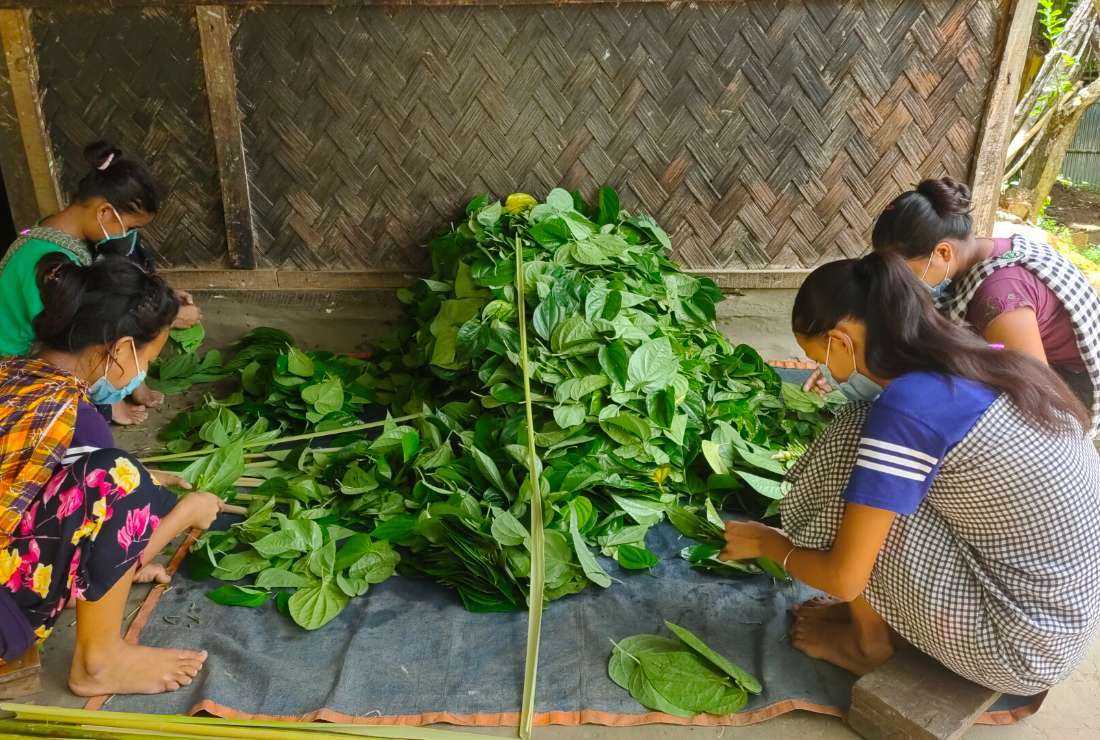
Khasi people have faced eviction threats for decades and they have intensified in recent years, an activist priest said

Tribal Khasi women sort betel leaves at a village in Moulvibazar district of Bangladesh. (Photo: Mintu Deshwara)
Bangladeshi rights activists and civil society representatives called for an immediate halt on an alleged attempt by the Forest department to evict dozens of Christian tribal Khasi villagers through the filing of false cases of encroachment on government land.
The call was made during a press conference in the capital Dhaka on Nov. 26 organized by Kapaeeng Foundation, a national-level tribal rights group.
The press meet came after a delegation of activists and civil society groups paid a visit to two Khasi punjees (forested villages) – Doluchhara and Muroichhara in the Moulvibazar district of northeastern Bangladesh on Nov. 23-24.
Doluchhara and Muroichhara have a total of 150 Khasi villagers and the forest department has filed fabricated charges against 15 villagers to evict them, activists alleged.
“The government should take immediate steps to establish legal and equitable rights of tribal Khasi people, proper protection of their livelihood, and prevention of conspiracies to grab their rightful land in the name of artificial forestry, prosecution of attacks on them and assurance of peaceful life,” rights activist and university profession Farha Tanzim told UCA News.
Tanzim was among the activists who visited the Khasi villages. She said they are aware of a nexus of local businessmen and government officials attempting to evict people for economic dividends.
“When we visited the punjees, we saw that the Khasis’ were being unjustly tortured, their eviction was being attempted with false charges, and local influential people were planning to evict the tribals by paying the government official for social forestry and tea plantations,” she added.
Khasi leaders say an official from the Forest department filed a land-grab case against 15 Khasi villagers, accusing them of illegally encroaching on government-gazetted forest areas to cut trees and smuggle cattle.
Arpils Marlia, a Khasi community leader said since the filing of the case the villagers have been living in fear of eviction.
“Local land grabbers joined by the forest department can evict and destroy our betel leaf plantations at any moment. This is why we are living in insecurity,” Marlia told UCA News, adding that the threat of eviction from local influentials is a common problem in many Khasi villages.
She pointed out that in February, some 20-25 men armed with sticks raided Nunchhera Khasi punjee to grab land.
In a written statement, activists alleged that the case filed this month came after a series of threats and assaults against Khasi villagers.
On Aug. 25 this year, unidentified miscreants cut down around 2,800 betel leaf plants, the main source of livelihood for Khasi people. On the same day, local thugs beat up some Khasi villagers on their way back home from a hospital.
On Aug. 28, thugs drove away betel leaf buyers as they tried to enter the villages for trade.
Lawyer Abul Hasan, general secretary of the Indigenous Rights Association of Sylhet division said allegations against Khasi people are baseless.
"Khasi people have been involved in managing forests naturally for generations. The ownership of the land should be kept in their hands to keep the forest intact," Hasan, a Muslim, told UCA News.
A forest official has denied any conspiracy and accused the Khasi people of occupying government land illegally for generations.
“Allegations of harassment of Khasi people are not true and forest officials did not file false charges against them. Khasis are illegally occupying the land of the forest department. They do not allow forest officials to go there,” Abu Bakar Siddique, the permanent assistant conservator of forests, told UCA News.
“Those who destroy nature or illegally encroach on forest land are prosecuted following the law, subject to appropriate witness evidence,” he added.
The Khasi are a matrilineal Mongoloid ethnic group mostly living in Bangladesh and northeast India. There are an estimated 40,000 Khasi in Bangladesh, mostly Christians, inhabiting forest villages and relying largely on betel leaf plantations for their livelihood.
Activist and Oblate priest Joseph Gomes said the Khasi people have been facing eviction threats for decades.
“It has now escalated to a different level. The situation has worsened as fabricated cases are being filed against them,” Father Gomes said.
Help us keep UCA News independent
The Church in Asia needs objective and independent journalism to speak the truth about the Church and the state.
With a network of professionally qualified journalists and editors across Asia, UCA News is just about meeting that need. But professionalism does not come cheap. We depend on you, our readers, to help maintain our independence and seek that truth.
A small donation of US$2 a month would make a big difference in our quest to achieve our goal.

Share your comments